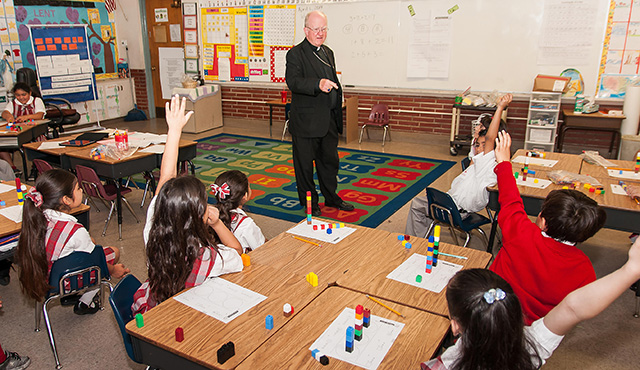The next generation of Catholic school students will come of age in the year 2035, and we can only speculate on the kind of world they will encounter. Will there be a cure for cancer? A revolutionized Internet? An economic boom? A war? What will be our country’s core values, and will they overlap at all with religion?
Predicting the future is futile, but we, as people of faith, can attempt to shape it. Thomas Jefferson knew that education was the key to effecting change within society. “Educate and inform the whole mass of the people, enable them to see that it is their interest to preserve peace and order, and they will preserve it,” he said. “They are the only sure reliance for the preservation of our liberty.”
So it is, too, for the church. We face times that can seem confusing and even threatening. Society has redefined marriage; science is redefining procreation; political leaders are rejecting the strangers in need within our borders; the killing of the unborn continues with few sanctions; the killing of the elderly is being redefined in terms of mercy. Just as alarming, the church currently is hemorrhaging young people. As Msgr. Owen Campion notes in his column, a staggering 50 percent of young Catholics under the age of 30 are falling away from the faith. These numbers are reflected in the downward trend of sacraments and the declining numbers in our Catholic schools.
But though the numbers may be dropping, the value of a Catholic education only increases in a society that is grappling with an influx of secularism. A Catholic education offers a spiritual and human formation that can’t be found anywhere else. When done right, it builds up parish life, strengthens families and, most importantly, integrates the teachings of the faith into everyday life. As such, we equip the next generation to go into the world carrying with them not only a diploma, but the light of the Gospel. Fully formed and informed, we begin to reshape society from within.
For parents, prioritizing a Catholic school education is no small decision. It encompasses not only monetary sacrifices (the average tuition for a Catholic elementary school is nearly $4,500; for secondary school, it is more than double that) but a commitment to spend time affirming at home the faith-based values that their children are taught at school. It means traveling extra distances to reach the nearest Catholic high school and staring at no small number of taillights in the drop-off line. These efforts are to be applauded and encouraged.
At the same time, this investment of resources and trust of parents must be taken seriously by Catholic schools. Dioceses and archdioceses must prioritize truly Catholic curricula, programs and educators that form the entire person both spiritually and intellectually. If possible, scholarships should be offered for those young people with fewer resources, encouraging both economic and social diversity. With parents and educators working together to instruct and raise young people in the faith, the world can’t help but be transformed.
As we begin another school year, there is much that is uncertain about the future of our society and our country. But it is our call to move forward in hope — a hope that Pope Francis defined earlier this year not as “a superficial optimism,” but as the ability to “risk in the right way — precisely like education.”
May we continue to take this risk of educating our children in faith, hope and love, thereby transforming the world.

